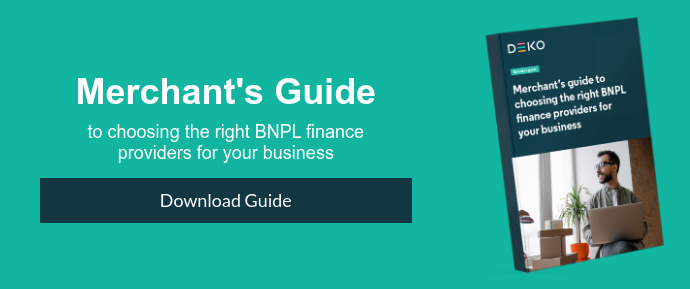Offering finance can help you boost sales whilst simultaneously empowering your customers with financial flexibility.But before you offer finance to customers, it’s helpful to understand the different types of finance available and whether they’re regulated or unregulated. With that in mind, this article examines the difference between regulated and unregulated loans and what it means to merchants.
What is regulated finance?
If a finance product is interest-bearing, or if it is repayable over more than 12 months, then it is regulated finance. If this is the case, the lender must be authorised by the Financial Conduct Authority (FCA) and hold the appropriate consumer credit permissions before offering the loan to consumers. Merchants looking to offer regulated finance to their customers will also need to be authorised by the FCA and hold credit broking permissions before advertising regulated finance products.
Examples of regulated finance include:
- A consumer loan for £2,500 to buy a new dining table and chairs, which is repayable over 24 months and is advertised as 14.9% APR.
- A digital credit account a consumer can apply for at a retailer’s online checkout, with 24.9% APR.
What is the Financial Conduct Authority?
The FCA is a regulatory body based in the United Kingdom. It operates independently from the Government and ensures that UK financial markets are honest, competitive and fair. It is awarded powers and statutory objectives under UK law, which require the FCA to:
- Protect consumers from bad conduct
- Protect the integrity of the UK financial system, and
- Promote effective competition in the interests of consumers
Currently, the FCA supervises over 50,000 firms, with differing levels of involvement depending on the size of firms and the risks they pose to consumers and the financial services market.
What is unregulated finance?
Unregulated finance is interest-free and repayable within less than 12 months. The most common example of unregulated finance is Buy-Now Pay-Later, which is often offered for lower-value purchases, as the instalment payments are more manageable for consumers.
Although these loans are unregulated, the FCA has been known to intervene if they identify concerns about how these loans are sold to consumers. For example, they have asked BNPL providers to change their contracts to be fairer to consumers, and have required firms to remove adverts about unregulated loans that could be misleading to consumers.
Some innovative lenders now offer short-term instalment plans for purchases at 0% interest on their digital credit accounts. Whilst the instalment plan may be interest-free, the underlying digital credit account is interest bearing and therefore these products are regulated.
With these instalment plans, if a consumer doesn’t make an agreed payment, their 0% interest plan will end and the amount borrowed will attract interest at the rate of the digital credit account (i.e. 24.9% as per the example above).
Examples of unregulated finance
Unregulated loans are common with buy now pay later (BNPL) lending. Generally speaking, BNPL offers interest-free finance to be repaid in three or four instalments. BNPL options are often suitable finance options for online stores that sell electronics, clothing and sporting goods, to name a few.
Why is BNPL so popular?
BNPL has increased in popularity over the last few years, especially with younger buying demographic cohorts. Millennials and Generation Z tend to prefer BNPL over traditional credit cards due to the ease of set payments, zero interest rates and the simple application process when applying. For merchants, BNPL provides them with an opportunity to meet consumer demand for flexible payment methods, whilst also avoiding the extra work that comes from becoming FCA regulated.
Are there any plans to regulate BNPL interest-free loans?
Currently, interest-free BNPL loans under 12 months aren’t regulated, but that is due to change. The UK Government and the FCA are implementing plans to regulate these credit products within the next two years. Much of the existing regulation that applies to regulated products today will apply to BNPL products in the future, although there will be some differences to reflect the different risks these products pose to consumers.
Regulated and unregulated loans
If you plan to offer interest-free finance over repayment periods that are less than 12 months then you will not need to apply for FCA authorisation. However, anything over a year or with interest requires regulation from the FCA.
Deko is an FCA-regulated credit broker and is able to appoint merchants who are not FCA authorised as its Introducer Appointed Representatives. This allows merchants to introduce their customers to Deko’s credit broking service without them having to apply for FCA authorisation, provided they meet and maintain Deko’s high standards of compliance and customer service.
Learn more about introducer-appointed representatives and connect with one of our team today to discover more about our finance products.





